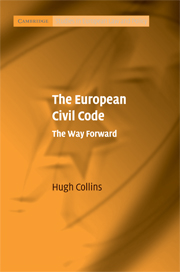Book contents
- Frontmatter
- Contents
- Preface
- Series editors' Preface
- Table of cases
- Table of treaties and legislation
- I Civil society and political union
- II The acquis communautaire in private law
- III The hidden code
- IV Private law and the Economic Constitution
- V Cultural diversity and European identity
- VI Respecting legal diversity
- VII Multi-level private law
- VIII Strengthening convergence
- IX Exploring the European Social Model
- Index
- CAMBRIDGE STUDIES IN EUROPEAN LAW AND POLICY
- References
VIII - Strengthening convergence
Published online by Cambridge University Press: 26 February 2010
- Frontmatter
- Contents
- Preface
- Series editors' Preface
- Table of cases
- Table of treaties and legislation
- I Civil society and political union
- II The acquis communautaire in private law
- III The hidden code
- IV Private law and the Economic Constitution
- V Cultural diversity and European identity
- VI Respecting legal diversity
- VII Multi-level private law
- VIII Strengthening convergence
- IX Exploring the European Social Model
- Index
- CAMBRIDGE STUDIES IN EUROPEAN LAW AND POLICY
- References
Summary
In chapter VII, it was acknowledged that the project for a European Civil Code in a multi-level system of government would not secure full harmonisation of private law. It was argued that such a result was desirable on several grounds, including innovation and respect for cultural and legal diversity. Nevertheless, the general ambition of building a European Economic Constitution does encourage steps towards a more detailed articulation and closer observance of principles of civil justice. Although a code of principles, enacted as a Directive, will take important steps in that direction, on its own it may provide insufficient impetus. To address that issue of the potential ineffectiveness of a European Civil Code to establish common principles that are routinely observed throughout Europe, this chapter considers further measures designed to strengthen convergence around the principles of a civil code as the foundations of an Economic Constitution.
These proposals do not primarily concern legislation and courts. Rather they employ alternative governance mechanisms that rely on cooperation and mutual learning. They do not try to impose uniform rules, but rather encourage participants to develop shared understandings of common principles.
Besides the particular proposals considered here, no doubt many other measures will contribute to convergence between national legal systems. As many law teachers have observed, the basic legal education of students will no doubt play an important role in encouraging a more comparative and transnational perspective on the interpretation of legal principles.
- Type
- Chapter
- Information
- The European Civil CodeThe Way Forward, pp. 210 - 237Publisher: Cambridge University PressPrint publication year: 2008



